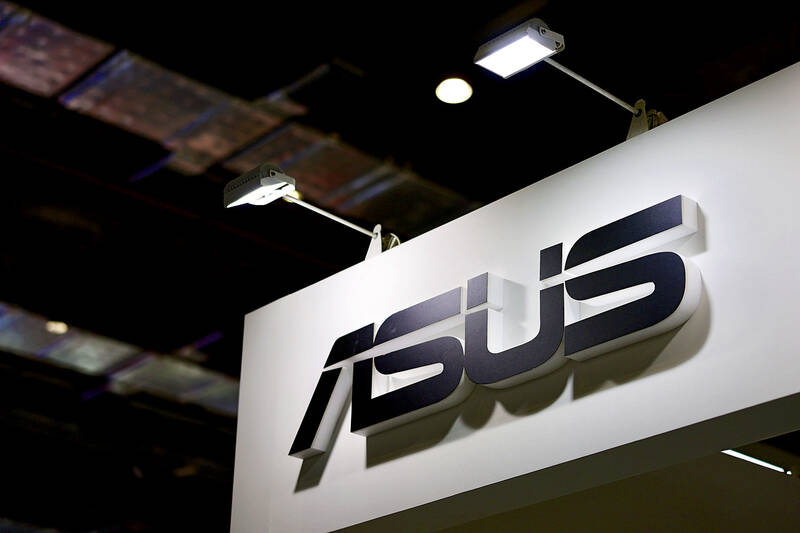PC vendor Asustek Computer Inc (華碩) yesterday reported a 681 percent surge in net profit for the first quarter, driven by an overdue payment from an Indian cloud service provider and rising PC and artificial intelligence (AI) server shipments.
The company’s net profit rose to NT$12.79 billion (US$419.96 million), compared with NT$1.64 billion in the previous quarter.
On an annual basis, net profit grew 135 percent.

Photo: Ritchie B. Tongo, EPA-EFE
The Indian customer had delayed payment totaling NT$5.35 billion since March, which had been retrieved by the end of the first quarter, Asustek chief financial officer Nick Wu (吳長榮) told an online earnings conference.
First-quarter revenue reached NT$135.19 billion, down 4 percent from the previous quarter, but up 18 percent from a year earlier on the back of growing shipments of PC and AI servers, Wu said.
Earnings per share rose to NT$17.2, up from NT$2.2 in the previous quarter and NT$7.3 a year earlier.
The company’s operating margin exceeded its guidance of 4 to 5 percent, rising to 8.5 percent last quarter, from 0.7 percent the previous quarter and 4.1 percent in the first quarter last year.
Excluding bad debts retrieved, the operating margin would stay healthy at about 4.5 percent, Wu said.
Gross margin reached 15.5 percent, down 0.5 percentage points from the previous quarter, but up 0.6 points year-on-year, supported by a higher contribution from the company’s gaming product line, he said.
A sharp appreciation of the New Taiwan dollar could pressure profits over the next three to six months, but in the long term, the declining US dollar would benefit the company’s operations, Wu said.
Asustek expects PC revenue to grow 25 to 30 percent sequentially this quarter, while that of components, primarily motherboards and servers, is expected to rise 10 percent, as it has already seen purchases ahead of high US tariffs, the company said.
“The whole [PC] industry, including gaming and edge AI sectors, is developing toward the positive side, so the adoption and expansion of our product lines are still increasing,” Asustek co-CEO Samson Hu (胡書賓) said.
To cope with potential US tariff uncertainty, Asustek began stockpiling three to six months of PC and notebook inventory in the fourth quarter last year and has implemented a flexible pricing strategy with its sales channels to reflect rising operating costs, Hu said.
The US market accounted for less than 15 percent of Asustek’s total revenue, compared with 47 percent and 31 percent for Asia and Europe respectively, he said.
While US tariffs have somewhat affected the PC market, Asustek remains confident in growing its shipments and market share this year to outperform the industry, he said.
The company’s leading positions in gaming PCs, graphics cards and motherboards, along with its exchange rate hedging strategy, would help bolster its ability to cope with market fluctuations, he added.
Asustek expects its server business, which contributed a double-digit percentage of total revenue last quarter, to make up about 15 percent of revenue this year, unchanged from its forecast last quarter.

NO BREAKTHROUGH? More substantial ‘deliverables,’ such as tariff reductions, would likely be saved for a meeting between Trump and Xi later this year, a trade expert said China launched two probes targeting the US semiconductor sector on Saturday ahead of talks between the two nations in Spain this week on trade, national security and the ownership of social media platform TikTok. China’s Ministry of Commerce announced an anti-dumping investigation into certain analog integrated circuits (ICs) imported from the US. The investigation is to target some commodity interface ICs and gate driver ICs, which are commonly made by US companies such as Texas Instruments Inc and ON Semiconductor Corp. The ministry also announced an anti-discrimination probe into US measures against China’s chip sector. US measures such as export curbs and tariffs

The US on Friday penalized two Chinese firms that acquired US chipmaking equipment for China’s top chipmaker, Semiconductor Manufacturing International Corp (SMIC, 中芯國際), including them among 32 entities that were added to the US Department of Commerce’s restricted trade list, a US government posting showed. Twenty-three of the 32 are in China. GMC Semiconductor Technology (Wuxi) Co (吉姆西半導體科技) and Jicun Semiconductor Technology (Shanghai) Co (吉存半導體科技) were placed on the list, formally known as the Entity List, for acquiring equipment for SMIC Northern Integrated Circuit Manufacturing (Beijing) Corp (中芯北方積體電路) and Semiconductor Manufacturing International (Beijing) Corp (中芯北京), the US Federal Register posting said. The

India’s ban of online money-based games could drive addicts to unregulated apps and offshore platforms that pose new financial and social risks, fantasy-sports gaming experts say. Indian Prime Minister Narendra Modi’s government banned real-money online games late last month, citing financial losses and addiction, leading to a shutdown of many apps offering paid fantasy cricket, rummy and poker games. “Many will move to offshore platforms, because of the addictive nature — they will find alternate means to get that dopamine hit,” said Viren Hemrajani, a Mumbai-based fantasy cricket analyst. “It [also] leads to fraud and scams, because everything is now

MORTGAGE WORRIES: About 34% of respondents to a survey said they would approach multiple lenders to pay for a home, while 29.2% said they would ask family for help New housing projects in Taiwan’s six special municipalities, as well as Hsinchu city and county, are projected to total NT$710.65 billion (US$23.61 billion) in the upcoming fall sales season, a record 30 percent decrease from a year earlier, as tighter mortgage rules prompt developers to pull back, property listing platform 591.com (591新建案) said yesterday. The number of projects has also fallen to 312, a more than 20 percent decrease year-on-year, underscoring weakening sentiment and momentum amid lingering policy and financing headwinds. New Taipei City and Taoyuan bucked the downturn in project value, while Taipei, Hsinchu city and county, Taichung, Tainan and Kaohsiung